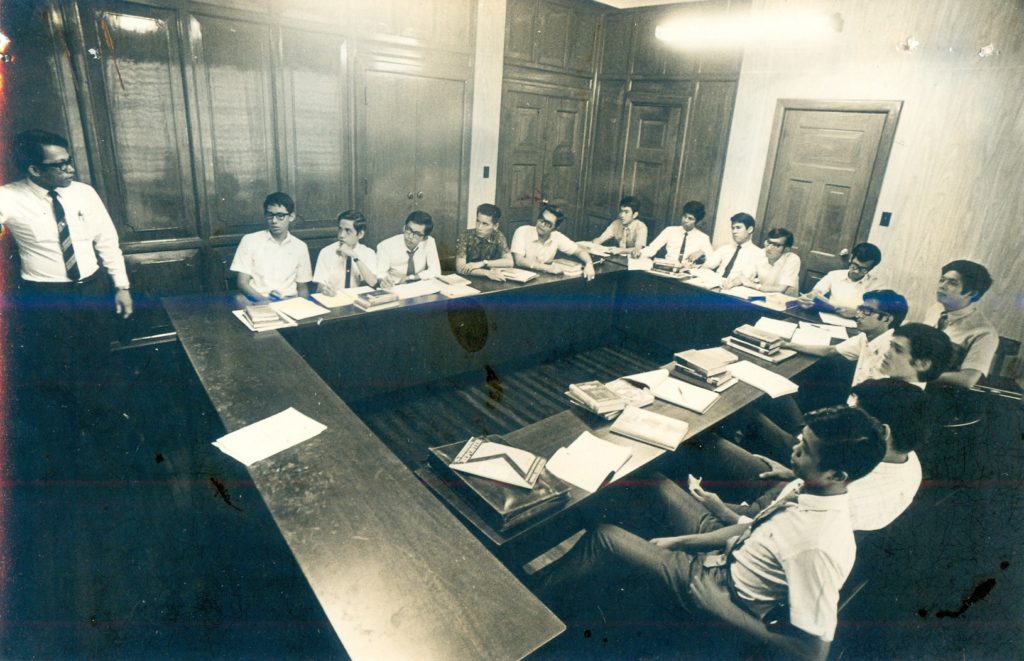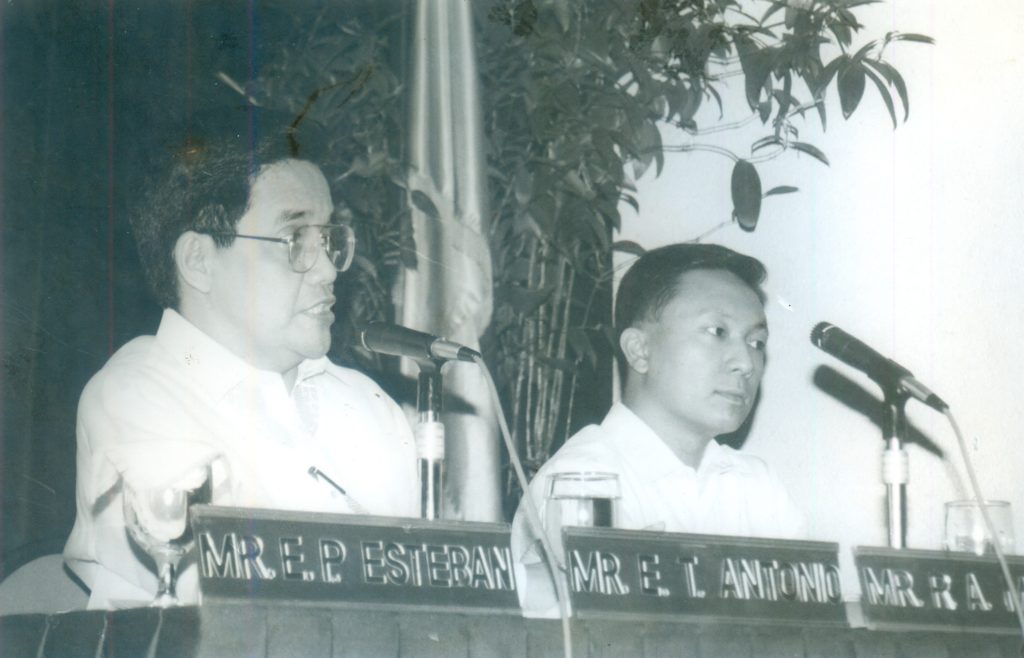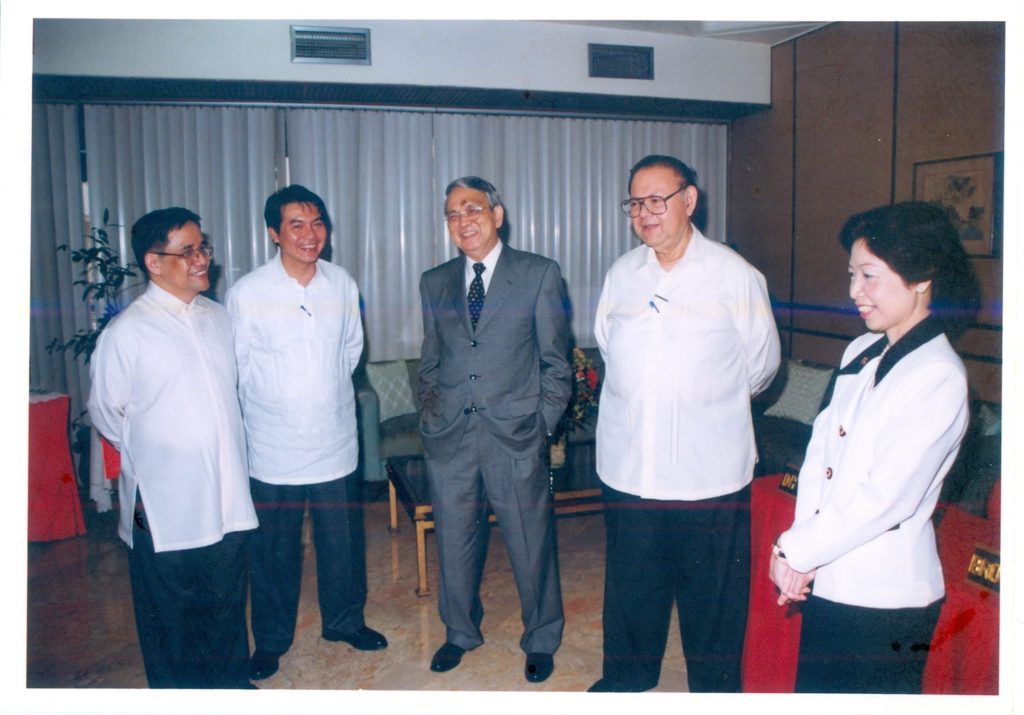(This article was first published in Universitas in August 1998.)
A 22-year-old chemical engineering graduate noted the address of CRC, applied, and the rest, as they say, is history.
“When I applied for the IEP (Industrial Economics Program), I thought it was a fly-by-night operation. I only decided to join it because I was desperate. I had a chemical engineering degree and at that time, in the 1970’s, there weren’t many job openings for a chemical engineer. The option was to become a salesman. I didn’t want to become a salesman. And here was CRC, offering a work-study program that provided a scholarship and stipends. I couldn’t ask for more,” reminisces Dr. Emilio T. Antonio, Assistant Dean of the School of Economic (SEC).

He didn’t know anybody in CRC at that time, except for Bobby Nazareno, the Admissions Officer. Dr. Antonio knew him through the Student Catholic Action, where Mr. Nazareno was active. Nevertheless, CRC’s goals and teaching methods attracted him from the start.
“Our relationship with the IEP professors was highly personalized. We were on a first-name basis. We called Dr. (Bernardo) Villegas, Bernie, and Dr. (Jesus) Estanislao, Jess. We used to go out quite frequently. I remember each semester we would go out of town and review what we had done for the semester. We were given a lot of tips on professionalism and on how to cope with graduate studies. Our professors also explained to us the vision for CRC to become a university.”
After the program, Dr. Antonio first became a research tutor and econometrics teacher to the first year students. Then, he became head of the information center of CRC’s research and support group. Afterwards, he joined the Operations Committee for the Business Economics School, the seedbed of the future School of Management. When CRC transferred from Bocobo Street (Manila) to Ortigas in 1982, the School was launched with Mr. Celerino Tiongco II as Chair and Dr. Antonio as Research Head.

After working for almost 10 years with the institution, he bagged a study grant in Germany. This meant bringing his wife, Shirley, and his two sons Eman (then five) and Joem (then two) with him. Mar, the youngest, wasn’t born yet.
“Maybe it was more of an accident,” he recalls. “I couldn’t think of going to the US because I had a family. It’s very difficult to live on scholarship alone. When the Hanns Seidel Foundation started to work with us, they were offering a “two-year vacation” to do research in Germany. I thought that since it was just financially impossible to pursue my Ph.D., it would be better to take a vacation for two years with my family and do research there in Germany.”
Dr. Antonio handled a research project at the IFO Institute in Munich. After staying there for one year, he got a scholarship for Advanced Studies in Economics Policy Research at the Kiel Institute of World Economics. It was a 10-month, non-degree diploma course. The Institute was attached to Kiel University where he eventually got his Ph.D. At Kiel, students had to know a professor who was willing to accept them for postgraduate studies. Dr. Antonio introduced himself to Prof. Dr. Horst Herberg and showed the professor what he could do. He got in; not only that—he has his scholarship with the Hanns Seidel Foundation extended, his work at CRC was validated, and he was allowed to go straight to a dissertation program. In addition, the Antonio family enjoyed the benefits of Germany’s social security system whereby the state funded their basic needs.
Outside school, Dr. Antonio spent a lot of time with his family. There, he instilled in his children a fondness for reading.
“I learned my German reading fairy tales to them. That’s the trick: you have to be able to converse. It was a nice experience for me. I rediscovered all those fairy tales and some of the German authors too. My children would never sleep until I read them a fairy tale. I enjoyed teaching them how to read. They have gotten the habit of reading. (Sometimes) I’m ashamed, they’ve read much more fiction (than I have).”
Germany looked like the land of milk and honey, but the prospect of working there never crossed Dr. Antonio’s mind.
“Before I returned to the Philippines, I passed by Geneva. There were many opportunities to work for international organizations like GATT, UPTAD, ILO, but it never crossed my mind to work there. I wanted to return to Manila and CRC. When I was in Kiel, I asked my classmates if they ever thought of building an institution. Most of them just wanted to finish their studies and get employed afterwards. For them, there were already so many established institutions in Germany that they couldn’t think of building another one. Things were different in the Philippines.”
He returned with that dream. Dr. Villegas and Dr. Estanislao, pioneers of the University, said they didn’t want to duplicate existing institutions. They wanted to contribute something new, a break from the usual university setup.
“That’s one thing that impressed me a lot. It was stressed right from the beginning of the (IEP) course that you had to be institution builders. So, in your own way, you have to build institutions that would help the country. You take this for granted now, but if you were there at the start, you would never believe this would happen. It was exciting because we were always developing something new. There was no repetition of the things; how can you be bored with a job like that? That explains why I stayed.”

A 1999 photo of Dr. Antonio with (L-R) Dr. George Manzano, UA&P President Dr. Mario D. Camacho, DECS Secretary Bro. Andrew Gonzales, and Ms. Susan Manzon.
There were already many economic schools in the Philippines by then, but they were more into teaching than into research. What set CRC apart was that it started as a think tank and was rooted in a culture of research. Dr. Antonio believes that this was the key to achieving SEC’s world class status.
Moreover, he wants economics to be accessible to everyone. Today, many “economic fallacies” circulate through the media and give the public confused ideas of economic issues.
There used to be a program in CRC Where IEP students taught economics to teachers in the provinces. This was the Master of Arts in Economics Education Program. Most of those teachers became so good they gave up teaching in favor of becoming professional economists. The Program was slowly phased out in 1978.
However, Economics Education is a concern close to Dr. Antonio’s heart. This is why he hopes to see the publication of a manual that will help teachers make economics a relevant and student-friendly subject.
Another publication that Dr. Antonio would like to write is a book on macroeconomics “with a lot of Philippine flavor” since most economics books today tackle Western or international economics.
A flourishing career, a supportive family, and several projects in the offing, Dr. Antonio certainly has many things to look forward to in the future.
Know more about the University of Asia and the Pacific here.
Leave a Reply